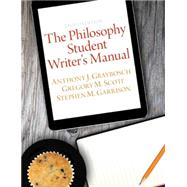Master basic skills of philosophical writing
The Philosophy Student Writer’s Manual, 3/e provides readers with the tools needed to write successful philosophy papers. The manual includes general background information on philosophy, helpful writing strategies, research tips, format instructions, and more. This user-friendly guide includes samples of excellent student writing that serve as concrete models for quality philosophical writing.








